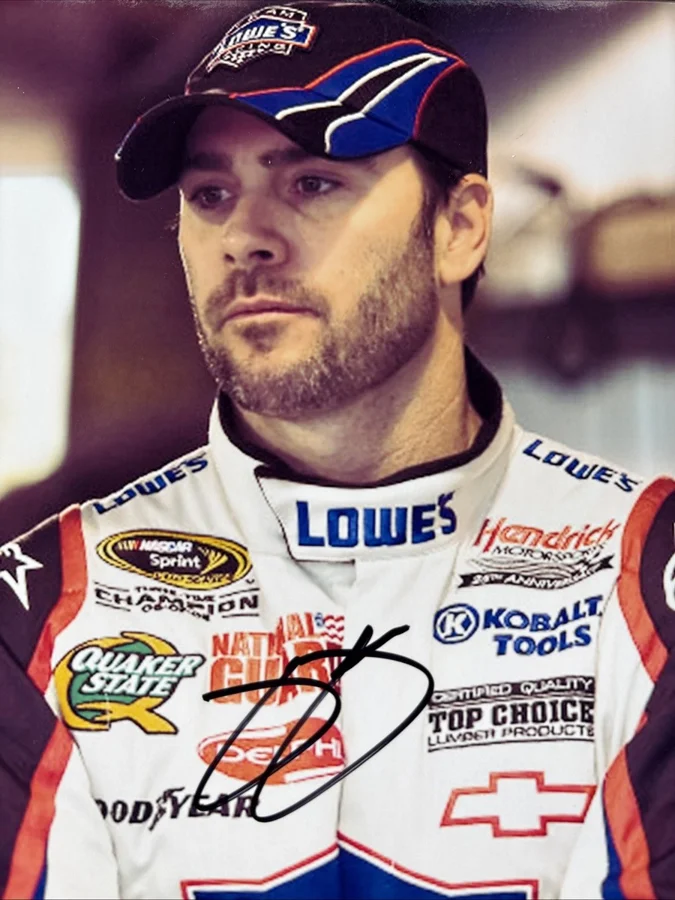Jimmie Johnson NASCAR legacy stands as one of motorsport’s most remarkable journeys, stretching from humble beginnings to historic championships, as Johnson turns 50 this week. Marking a milestone birthday, racing fans and colleagues alike are taking stock of his profound impact on the sport, acknowledging decades of resilience and triumphs on the track.
From Quiet Rookie to the Start of a Momentous Career
Two decades ago, Jimmie Johnson was just a young rookie, mostly unrecognized and overlooked, among the NASCAR Busch Series newcomers. As a young underdog with little fanfare, he didn’t attract much attention, competing for lesser-funded teams and having yet to register notable finishes or lead a lap in his early races.
June 2000 marked an indelible moment. Johnson didn’t clinch victory or make headlines for winning, but he secured a place in highlight reels after a dramatic crash. His red, white, and blue car, more out of control than racing, shot toward the wall, ultimately getting buried in a mess of debris. Despite the wreck’s harrowing appearance, Johnson emerged, triumphantly standing on his car’s roof, arms outstretched, alive and relieved—a moment that showed both his youthful exuberance and will to continue.
Initially, some would misinterpret this bravado as arrogance, but for many, relief prevailed that day. In that instance, Johnson was less a controversial figure and more a young driver with nothing but opportunity stretching before him, simply grateful for another chance to race.

The Turning Point: A Chance with Hendrick Motorsports
Jimmie Johnson’s break came when Hendrick Motorsports, a leading force in the NASCAR Cup Series, made an unexpected decision. Jeff Gordon, already an established star and part-owner of the new No. 48 team, saw untapped potential in Johnson—a rare combination of talent and drive. Despite only one career victory in what is now the Xfinity Series and no further wins there to come, Gordon’s belief would soon be justified.
Upon stepping up to NASCAR’s premier level, Johnson’s performance became impossible to ignore. He clinched his first title after just five seasons, during which he accumulated 27 wins—figures that already placed him among the sport’s greats. His rookie year in 2002 was especially notable: three wins and the unprecedented feat of leading the driver standings as a rookie.
As Johnson’s career progressed, he dominated the competition. Over the next decade, he collected more victories and a stunning six additional Cup Series championships, establishing himself alongside legends such as Richard Petty and Dale Earnhardt.
Champion by Skill, Not by Controversy
Unlike some peers, Johnson’s methods on the track rarely involved aggressive maneuvers or causing accidents with rivals. His strength lay in problem-solving during tense situations, ensuring his team received clear, constructive feedback and maintained cohesion. While emotions occasionally ran high, Johnson avoided unnecessary confrontations, instead exhibiting a calm and dignified approach that further set him apart as a champion.
What made him formidable was the relentless pursuit of victory. Often in challenging circumstances or underperforming equipment, he managed to make race-changing moves, surprising onlookers with his determination. Critics might say his titles were not as significant as those of Petty or Earnhardt; however, Johnson consistently succeeded under every format NASCAR presented him, adapting seamlessly even when rules changed mid-career.
In the ultra-competitive landscape of motorsports, missing out on a full-season crown by mere points in 2003 only underscored his close contests at the sport’s highest levels.
The Waning Years and New Roles in Racing
Johnson’s long dominance made its abrupt conclusion startling for many fans. He managed three Cup Series wins early in 2017 but did not pick up another victory before shifting his focus from NASCAR, embarking on a brief stint in the NTT IndyCar Series. Despite stepping away from full-time driving, his presence remained, rooted not only in nostalgia but also new ventures.
His instant election into the Hall of Fame, alongside his legendary crew chief Chad Knaus, was a testament to his impact. Transitioning to team ownership, Johnson invested in Legacy Motor Club, leveraging his experience to guide new talents like Erik Jones and John Hunter Nemechek. Even as he drives occasionally to satiate his competitive spirit, it is clear his involvement in shaping the next generation is just beginning.
Reflecting on a Lasting Legacy in NASCAR
Turning 50, Johnson stands as more than just a former racer; he is a figure whose influence ripples through the sport. The passage of time feels paradoxical, with memories of his earliest moments still vivid for many—those images of a youthful Johnson emerging from a crashed car, juxtaposed with the seasoned team owner and mentor he has become.
As NASCAR moves forward, drivers like Jeff Gordon, Richard Petty, Dale Earnhardt, Chad Knaus, and the current field continue to reference Johnson’s bar-setting approach. His journey from unheralded rookie to seven-time champion remains a testament to perseverance, adaptability, and unwavering competitive spirit. The story of Jimmie Johnson NASCAR legacy continues to evolve, inspiring both newcomers and veterans who aspire to leave their own marks in racing history.
